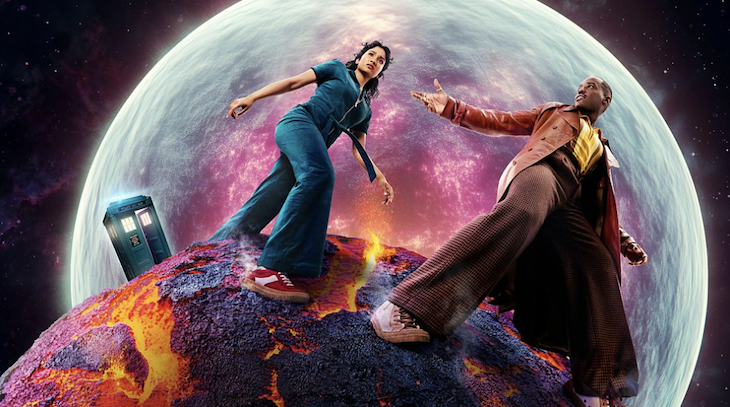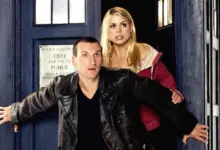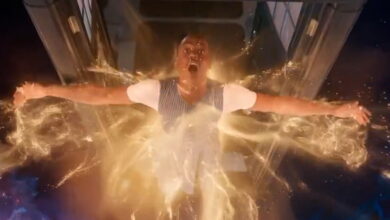Doctor Who needs a break…

Twenty years on from its spectacular revival it looks like Doctor Who might not be returning to our screens again in the immediate future. I haven’t actually watched Doctor Who for a long time, but because I wrote an awful lot of it for years – on TV, but also books, comics, radio plays, yogurt pot labels, you name it – people always ask me what I think should become of it. My answer? I’d cancel it and flee for the hills.
Doctor Who was born in an age when we didn’t need to rabbit on about our ‘values’
Twenty years is an incredible run, almost equalling its original marathon from 1963 to 1989. In TV parlance, it needs to be ‘rested’.
Stepping back from a thing enables you to see it from the outside, which has been quite a jolt. I’ve seen Doctor Who whizzing by from the corner of my eye for years now, the way others see it. From that buzzards-eye view it seems like absolute screaming madness.
When any long-running endeavour hits trouble, you have an opportunity to really peer at its fundamentals. What is it for? Who is it for? Is it worth all our bother? Like the Conservative party, Doctor Who is a lingering institution fashioned in, and for, a lost age. Perhaps we need a Badenoch-style analysis of what went wrong?
Firstly, and it seems incredible it should be necessary to say this, but Doctor Who does not contain the meaning of life. It should never go anywhere near the profound, except in the lightest, most playful terms. There is nothing wrong or small about being a weekend treat that’s mainly for children and indulgent parents. There are many slight, passing things that enhance life, but we don’t look to bouncy castles or trips to the zoo to reveal the secrets of existence, or politics, or anything else.
Doctor Who was born in an age when we didn’t need to rabbit on about our ‘values’, and certainly not in our pulp pop culture. Looking back twenty years on, its revival in 2005 as a prestige production was a warning sign that something was very wrong with the TV industry in general, as if Basil Brush was back but written by Dennis Potter and freighted with mortal significance. In its original run, it had the unique ability to lift up TV writer ‘hacks’, and make them fly a little; the revival sometimes seemed to have the reverse effect.
It is unique in several ways. It is not another ‘sci-fi’ in the accepted sense, more a very peculiar genre of its own. And it is absolutely not a saga, more a fun trip somewhere new every story. My iron law of Doctor Who is that if something carries over from one story to any other (barring the Daleks), it’s almost always going to be a bucket of incomprehensible nonsense. But that picaresque, fly-by-night quality at the core of the thing is anathema to modern TV, which is all about sagas, journeys and arcs.
To be fair the makers of Doctor Who tried to pare it back to basics in 2018 for the first series featuring Jodie Whittaker, but it unfortunately just wasn’t good enough. When that didn’t set the world alight, they panicked and threw the kitchen sink of the series’ baffling history and lore at it, to ever diminishing returns.
Another issue is Dr Who himself. He is not a character part, but a personality part. He is loveable and fun to watch, with entertainingly naughty and askew interactions (Tom Baker and Matt Smith did this particularly well). You can run a show for years on that simple basis, refreshed for a new generation of youngsters with a new actor every few years. A few gags, a few scares for the kiddies, end of.
But if you treat the Doctor as an acting part, which we did, you very swiftly run out of new things to say, and he becomes a pompous, maudlin berk. The whole affair starts to revolve around him, as a fetish – everyone starts up with cod poetry dialogue – ‘he’s like ice, fire, rain and stars etc etc’. He just can’t take that weight (and see also James Bond and Batman). Angst and the Doctor just doesn’t ring true, and pretty much nobody tunes in to see him all of a tear-stained dither.
This show is meant to be a treat for the young at heart, a liberation from the drudgery of work and school. It is absolutely not for its obsessives. They will always watch, even if – especially if – they hate it, and are the very last people to be catered to. ‘Content’ that drives social media ‘engagement’ is the wild goose of the modern TV industry; having a silo of a few thousand tweeting nutters makes absolutely no difference to your bottom line, and they scare ‘normies’ off your brand.
Because Doctor Who is for everybody. One fine, far-off day somebody may remember that, and – though it seems impossible right now – it could thrive again, in whatever shape the media takes in the future. But I’m afraid the Tardis needs a prolonged period among the mothballs.








